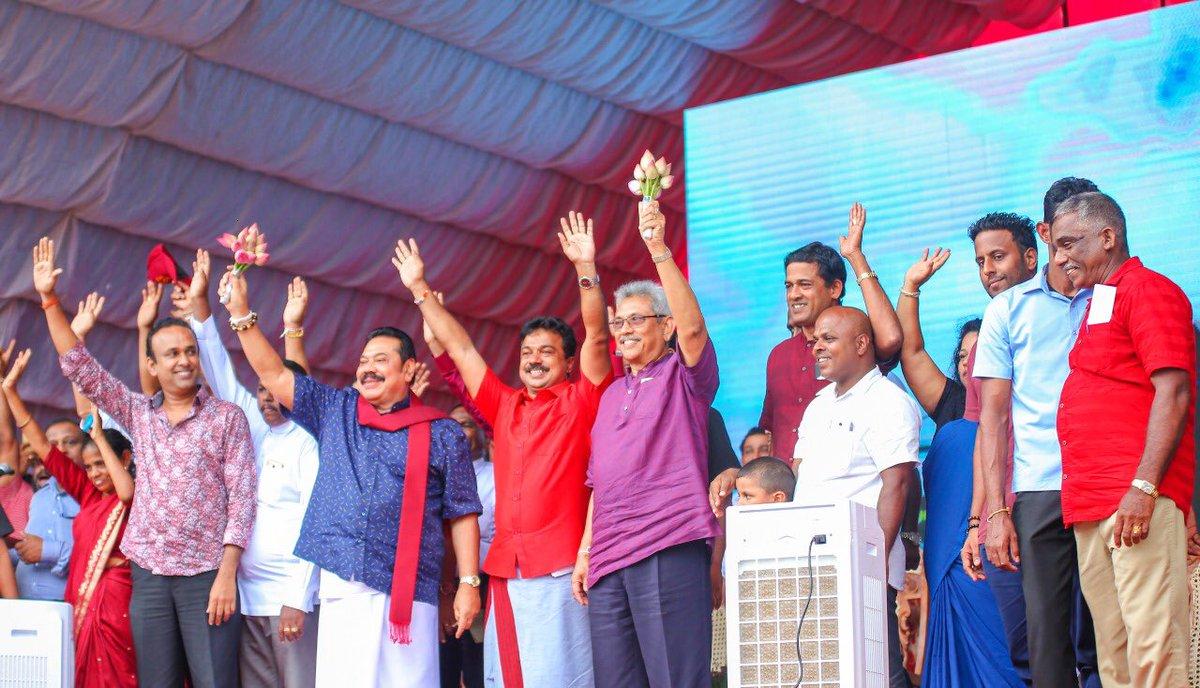
One of Asia’s oldest democracies may be in jeopardy. Sri Lanka’s presidential election next month is expected to bring to power another member of the Rajapaksa family, whose affinity for authoritarianism, violence and corruption is well known. While Sri Lanka’s democracy survived the last test—an attempted constitutional coup by outgoing President Maithripala Sirisena a year ago—it may not survive a Gotabaya Rajapaksa presidency.
Gotabaya, as he’s popularly known, is the current frontrunner and previously served as Sri Lanka’s defence chief under his older brother Mahinda Rajapaksa, Sirisena’s predecessor. Mahinda’s decade-long tenure, which ended in 2015, was characterised by brazen nepotism, with the four Rajapaksa brothers controlling many government ministries and about 80% of total public spending. And by steadily expanding presidential powers, Mahinda created a quasi-dictatorship known for human-rights abuses and accused of war crimes.
Moreover, Mahinda’s pro-China foreign policy allowed for the swift expansion of Chinese influence in Sri Lanka—and rapid growth in Sri Lankan debt to China. It was the debt incurred during the last Rajapaksa presidency that forced Sirisena in 2017 to sign away to China the Indian Ocean’s most strategic port, Hambantota, along with 6,070 hectares (15,000 acres) of nearby land, on a 99-year lease. This Hong Kong–style concession was modelled on the United Kingdom’s 19th-century colonial imposition on China.
There’s little reason to doubt that Gotabaya would revive his brother’s corrosive legacy. Simply by becoming president, he could gain immunity from two lawsuits pending in US federal court over war crimes allegedly committed while he was Sri Lanka’s defence chief. (With the parliament’s restoration of presidential term limits prohibiting Mahinda from running again, Gotabaya renounced his US citizenship to become eligible to contest the election.)
Mahinda oversaw the end of Sri Lanka’s brutal 25-year civil war in 2009. But he was no agent of peace. During the war’s final years, thousands of people—from aid workers and Tamil civilians to the Rajapaksa family’s political opponents—disappeared or were tortured. And the final military offensive against the Tamil Tiger rebels was, according to the United Nations, a ‘grave assault on the entire regime of international law’, with as many as 40,000 civilians killed. According to the wartime military commander, Sarath Fonseka, Gotabaya ordered the summary execution of rebel leaders as they surrendered.
Despite the horrors they inflicted on Sri Lanka’s mostly Hindu Tamil minority, the Rajapaksa brothers became heroes to many among the country’s largely Buddhist Sinhalese majority. That emboldened Mahinda to step up efforts to fashion a mono-ethnic identity for a multiethnic country.
Renewing this approach, as Gotabaya is sure to do, will hardly ease the sectarian divide that triggered the civil war, let alone more recent tensions between the Sinhalese and Sri Lanka’s Muslims. Those tensions increased sharply in April, when Islamist militants carried out a series of bombings on Easter Sunday that killed 253 people and wounded hundreds more.
Not only was this one of the deadliest terrorist attacks in history, it was also the first major Islamist militant attack that Sri Lanka, where Muslims constitute one-tenth of the population, had ever experienced. But that doesn’t mean it was unforeseeable.
In fact, Sirisena admitted that defence and police officials had received an Indian intelligence report warning of an imminent attack and identifying the plotters, but that he had not seen it. Nor did Prime Minister Ranil Wickremesinghe—the target of Sirisena’s attempted coup last October—receive the warning. (Sirisena abruptly fired Wickremesinghe and swore in none other than Mahinda Rajapaksa, before dissolving parliament to avoid a challenge. His actions were reversed when the supreme court ruled them unconstitutional.)
The Rajapaksas have already used the Islamist bombings to fan the flame of Sinhalese nationalism. And Gotabaya has promised his supporters that, if elected, he will strengthen the intelligence services and reintroduce surveillance of citizens, in order to crush Islamist extremism. The prospect of an alleged war criminal still wedded to extrajudicial methods becoming president rightly terrifies minority groups, the media and civil-liberties advocates.
There’s more worrisome news, though. Gotayaba’s camp has also confirmed that, as president, he plans to ‘restore relations’ with China. Given Sri Lanka’s strategic location near the world’s busiest sea lanes, the implications of this pledge extend well beyond the island. Indeed, Sri Lanka could play a pivotal role in the struggle for maritime primacy between China and Indo-Pacific democratic powers (India, the United States, Japan and Australia). China’s ‘string of pearls’ strategy has been encircling India by securing strategic military and commercial facilities along major Indian Ocean shipping lanes. The Hambantota port, which Chinese President Xi Jinping described as central to his Maritime Silk Road project, is a particularly valuable pearl.
At a time of growing international skepticism toward Xi’s Belt and Road Initiative, the Rajapaksa family’s potential return to power in Sri Lanka is welcome news for China, which hopes to turn the country into a military outpost. But it’s bad news for practically everyone else. A Gotabaya presidency would block already-delayed justice to victims of his brother’s regime, deepen ethnic and religious fault lines, and help China gain strategic supremacy in the Indo-Pacific. Sri Lankan democracy appears more vulnerable than ever.